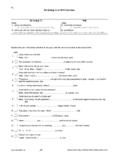Transcription of Communication Worksheet - Betty Therapy
1 CommunicationWorksheetFrom the moment a child is born they start to communicate with those around them. One important thing in understanding your child is learning how they communicate what they need and how they is the key to Communication with your child. Listening means giving your full attention to what your child has to say. It also means watching their behaviour and actions because children often find it difficult to put their feelings and thoughts into words because they don t have the language. (NSPCC 1998 positive parenting)Please circle the words that describe what you experienced as a child from your the words Anger Honesty Changing their mindEncouragement Shouting Patience TrustingTeasing Firmness Consistency Being laughed atBlaming Being too busy Violence OpenessLoving Smacking Listening SharingListening Hugging Being Valued BoundariesWrite the words and think about the words you have circled and decide which words you would describe as helpful and unhelpful parenting.
2 Helpful Parenting Unhelpful ParentingWrite the words in the which you feel are the most important to you and your child from your helpful parenting our next sessionThink about the words you would like to add to the helpful parenting list that you use with your we act in an open and accepting way with our children and when children are respected as individuals and listened to, it affects the way they see themselves. They grow in self confidence and learn to respect their own feelings and those of others. You andyour childDP12307 Have a think about how you show affection to your child and list the words down 3 things that are wonderful about your child1. 2.
3 Have a think about 3 things that you really enjoy about being a Development WorksheetThis Worksheet explores how you can meet your child s emotional needs. As a child gets to know a person who creates feelings of comfort and security, a special bond develops. The more a child is cuddled and loved, the more affection you show your child, the stronger the bond is likely to about a time when someone said something nice about your behaviour, appearance or was it? How did it feel?How does your child know when you give them positive attention?Before the next think about how your child knows when you give them positive attention. Be careful to notice and comment when they are behaving well and make sure your child can see your face and knows by your smile and tone of voice that you are giving them praise.
4 Remember to write down the reaction of your child when you give them your positive what your child says or does when you give them positive attention over the next few weeks and how their response makes you and Guidance WorksheetBoundaries are the limits that you set on activities or relationships; they help to define what is acceptable or unacceptable in a relationship. Firm boundaries also help to make a child feel secure as they know where they stand .Sometimes setting boundaries can be difficult and there may be times when you feel like giving in. It may be useful to share this Worksheet with someone close to you as they may be able to help you in this challenge. There may be someone who helps you with childcare partner or parent.
5 If all the people around your child are delivering the same message this will help you to maintain : if there is no consistency there is no boundary. Considering boundaries , think about your partner/sibling/friends. What are the boundaries that exist in your relationship?Write Now What action(s) would you take if these boundaries were crossed? If your immediate thought is none , consider the message this gives out. How will you teach your child about boundaries if you find it difficult to enforce your own? What impact will this have on your child?Striking the balanceThink back to your childhood, do you remember growing up in a strict household (rigid boundaries) or did you grow up in a household where you were able to do as you please (no boundaries)?
6 Were you allowed to express your feelings? Were you always being told no ? Did you always get your own way? How did this make you feel?It is essential that there is a balance. It is important that your child s thoughts and feelings are considered so that your child feels believed and listened to which in turn helps them to develop emotionally. However, there are times when boundaries need to be reinforced regardless of what your child feels he/she may want/need removing a child from a dangerous situation, for example, playing on the the other extremeRIGID boundariesConsequenceNO boundariesConsequenceParent has all the power. No two way Communication as parent is always rightCan lead to child s withdrawal or rebellionChild has all the powerChild can run riot and feel insecure.
7 Parent s word has no effect on childEnhancing boundaries and communicationIt is important Yes No Not sureMy child can express his thoughts and opinions I give my child instructions where necessary I am a friend to my child I talk to my child about everything I listen to my child Consider if there are any exceptions to what you have marked and Stimulation WorksheetThis Worksheet looks at how you and others can meet your child s developmental needs and provide a safe, stimulating environment for your and stimulationWhat is meant by stimulation?Play and stimulation are essential for a child s physical, emotional and intellectual development (learning). By thinking about how you can provide appropriate stimulation, you are showing that you are striving to meet you child s changing needs.
8 You are also showing that you are trying to get to know them as an individual by learning about their likes and dislikes. It is important that you try to make a stimulating environment at home. A stimulating environment is one that offers something pleasant for all your child s senses (touch, smell, sight, taste and hearing)List 3 things that you enjoyed as a young and under/over stimulation Our emotional state can change throughout the day, sometimes from hour to hour. Sometimes we want to be quiet and reflect on our thoughts; during this time we may not want to talk to people. How would you feel if someone did not respect this? How would your child feel? Other times we may feel happy, talkative or your own moods, complete the exercise mood What helps What doesn t help IrritableSad/tearfulBoredExcitedTiredLis t 4 activities which incorporate the following senses Taste is not included here as it is not appropriate before 6 months of ageSmell TouchHearingSightMake all the activities fun, even everyday tasks like bathing, nappy changing and feeding.
9 Just simple activities like smiling at your baby strengthens the bond between you both and helps your baby s brain the next sessionThink about your home environment and whether this provides adequate stimulation for your child. Think about how your child will be affected if the environment is not stimulating enough for your you have access to books or toys? If not, can you think of any places where you may be able to access them? Ask your health visitor if you are not you were a child, can you remember what happened to you if you didn t do as you were told?Circle the words below which represent how you might feel when you have to say no to your child. Mean Uneasy Happy Not bothered At easeWhy do you think you feel like this?
10 What would happen if you didn t say no?Instead of saying no are there any other courses of action you could take?Behaviour WorksheetAs your child grows up, their personality will start to develop and they will challenge the boundaries or routines (or both) that you have set. The following Worksheet will help you look at these behaviours and how to address to manage inappropriate behaviour1. Verbal reminder2. Time out3. Temporary loss of privilege Use 1 before moving onto 2 and 3. Always follow through otherwise 1 will bear no meaning whatsoever. Consequences should always reflect the severity of the inappropriate behaviour. Smacking and withdrawing love ( ignoring the child for prolonged periods) are never acceptable ways of managing behaviour.





